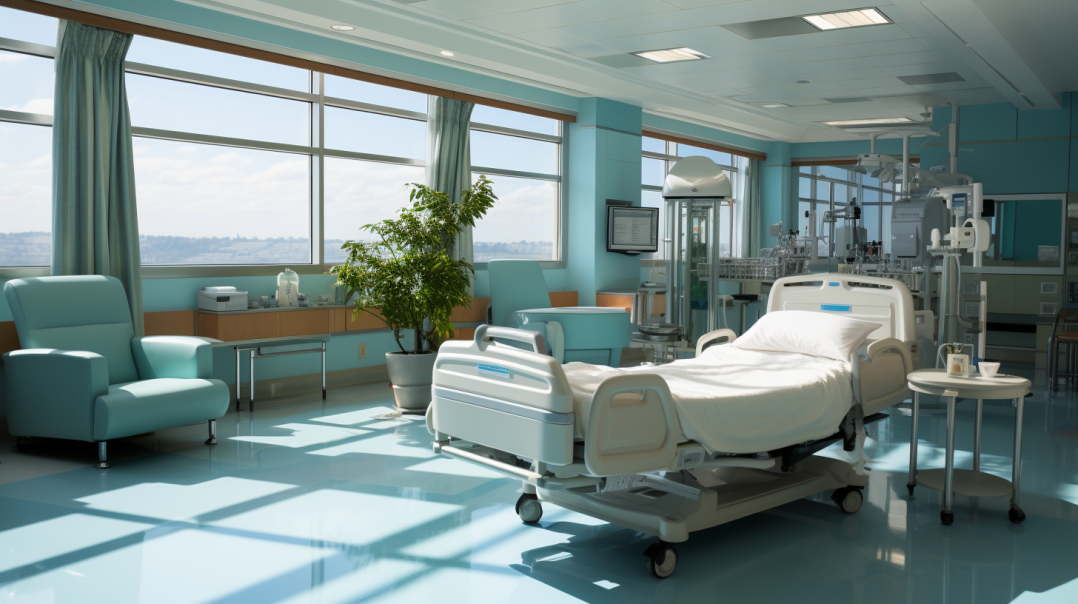Due to the nature of medical care, hospitals are a hotbed for harboring bacteria and viruses that spread communicable disease. Without meticulous attention to detail when it comes to keeping hospitals safe and clean, the risk of transmitting disease to patients and staff becomes substantial.
In fact, roughly 1 in 31 patients become infected with a Healthcare Associated Infection (HAI) on any given day. This poses a serious risk to both patient health and safety as well as imposing over $28 billion in additional healthcare costs each year.
With that said, if you are responsible for facility safety and management at a hospital, it is imperative to take every measure in the book to ensure your facility is properly cleaned.
The following article breaks down 9 key tips you can take to ensure your hospital facility remains safe and clean for patients, staff, and visitors.
Infection Control Measures
As a facility manager or administrator, you must ensure standard infection prevention and control measures are in place and consistently followed.
This includes hand hygiene practices, proper use of personal protective equipment (PPE), and following isolation procedures when necessary and appropriate. Staff should be trained to wash hands before and after every patient contact to minimize the potential for spreading germs from one location or person to another within the facility.
Hospital cleaning staff must be better trained and equipped than standard cleaning staff. In addition to knowing the detailed facility-specific protocols, staff members should be certified through an appropriate medical cleaning certification organization.
Regular Cleaning and Disinfection
Ensure regular and thorough cleaning and disinfection of surfaces and high-touch points, such as door handles, elevator buttons, and light switches. Use hospital-grade disinfectants to kill bacteria and viruses. Proper hospital cleaning protocols should include a robust checklist to ensure staff do not miss any key areas or points of contact during regular cleaning rounds. This list must include both scheduled cleanings and protocols for contamination events such as spills that require an extra cleaning.
Proper cleaning supplies must be stocked at all times including floor cleaner, glass cleaner, neutral cleaner, clorox/bleach wipes, and any specific fungicides, virucides, and antibacterial agents appropriate for each area of the facility.
Advanced Cleaning Protocols
It’s highly recommended to consider advanced cleaning methods such as Hydrogen Peroxide (H2O2) fogging conducted by expert staff. This cleaning method is much more effective at eliminating highly dangerous methicillin-resistant Staphylococcus aureus (MRSA) and Pseudomonas aeruginosa than traditional disinfectants.
As technology continues to advance, you must stay up-to-date on the latest developments in hospital disinfection procedures to ensure you stay ahead of the curve on cleanliness and grow your facility’s reputation for ensuring the health and safety of your patients, staff, and visitors.
Waste Management
Implement a robust waste management system. Biohazardous waste should be properly segregated, stored, and disposed of in compliance with local regulations.
Soiled rags, used needles and tubing, and other medical equipment that makes contact with patients must be properly disposed of immediately after use. Regular internal audits can help ensure compliance with protocols.
Air Quality Control
Maintain good air quality in the hospital, especially in operating rooms and intensive care units. This may include air filtration systems, maintaining positive pressure in certain areas, and regular inspection of ventilation systems.
With airborne diseases such as measles, tuberculosis, chickenpox (Varicella), COVID-19, and influenza, a filter rated for clearing these diseases is an absolute must.
Visitor Policies
Implement strict visitor policies to prevent the introduction of infections. This may include screening for symptoms, limiting visiting hours, requiring hand hygiene, and providing PPE if necessary. While visitors are an essential part of ensuring your patients’ morale and recovery, it’s important that they do not become a source or transmission vector for disease in your facility.
Water Quality Control
Regularly test water systems to prevent the spread of waterborne pathogens. This is especially important for systems like ice machines, sinks, and showers. Regular testing typically includes microbial, chemical, and physical testing of your hospital water. This not only helps keep your patients and staff safe, but it also extends the lifespan of your equipment.
Regular Inspections
Conduct regular inspections of the facility to identify any potential risks, such as damaged equipment, poor sanitation, and other safety hazards. Corrective actions should be taken promptly. Uncorrected hazards can swiftly snowball into facility wide outbreaks that pose grave health and financial risk to your entire hospital.
Encourage a Culture of Safety
Promote a culture of safety and cleanliness among all staff members. Encourage everyone to take responsibility for maintaining the cleanliness and safety of their workspace, and to report any issues or concerns. Recognition of good practices can also help reinforce this culture.
Hire a professional cleaning agency
Given the cost of HAIs you should think of proper hospital cleaning as an investment, not an expense.
While maintaining a cleaning staff department is a possible option, consider hiring a professional cleaning agency certified and trained in proper hospital cleaning and disinfection procedures.
Outsourcing your hospital cleaning needs can reduce the cost of maintaining and supervising in-house staff while raising the standards of cleanliness within your facility, since the burden of training and equipping staff falls on the cleaning company.
Additionally, experienced hospital and medical facility cleaners have access and training on more advanced cleaning techniques such as H2O2 fogging, which prevents you from needing to source, manage, and equip your own staff on the most recent developments in disinfection protocols in the industry.
With over 5 decades in the professional cleaning industry, Pegasus delivers unparalleled hospital cleaning services. Our innovative approach includes the latest technologies and procedures that ensure your facility is kept above and beyond the current industry standards.
Contact us today to find out how Pegasus can help you guarantee the safety and health of your patients, staff, and visitors within your hospital facility.





